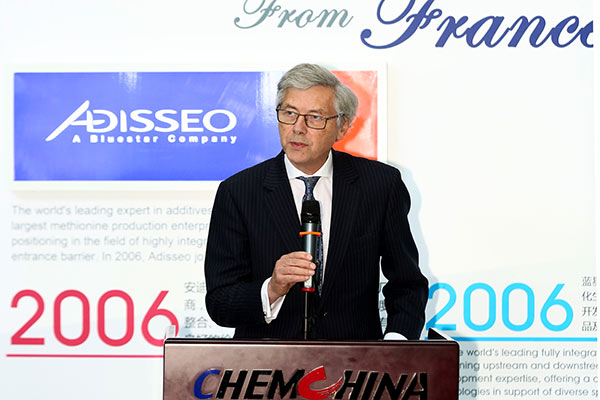Helping China Inc to master M&As
 |
|
Olivier de Clermont-Tonnerre, chief strategy and corporate development officer at China National BlueStar (Group) Co Ltd. CHINA DAILY |
Mergers and acquisitions, or M&As, are akin to raising a child-they take time and require wisdom. That is the philosophy of Olivier de Clermont-Tonnerre, 66, chief strategy and corporate development officer at China National BlueStar (Group) Co Ltd, which is engaged in new chemical materials and animal nutrition.
The Frenchman must know-he is an expert in cross-border M&As, and has been involved in many such deals featuring Chinese companies.
The mild-mannered, charismatic corporate executive believes in preserving and synthesizing corporate cultures of companies that merge or are involved in acquisitions.
So spectacular is his track record in effecting successful M&As in a way that strengthens local industry and boosts economic growth that the Chinese government included him among this year's Friendship Award winners.
"I'm very proud (to receive the award) as it is given to only a select few, all experts from different sectors," said Clermont-Tonnerre, sitting in a meeting room at the company's Beijing headquarters.
He joined BlueStar, a subsidiary of China National Chemical Corporation, or ChemChina, in 2007. He now holds the additional post of director, which means he spends loads of time trying to strengthen the company in every conceivable way.
He has been instrumental in BlueStar's acquisition of Rhodia Silicones, Elkem and REC Solar and founding of BlueStar Silicones International or BSI, all major deals that helped consolidate the company's silicone business worldwide.
"The most important part of the acquisition is to make sure that the management of the target company is supporting the vision you have. And we cooperate fully in order to create one company from two different cultures and two different backgrounds," he said.
The post-merger integration is the most difficult part to manage, he said. "Making an acquisition takes time. But integrating a company into a totally 'new baby', which is the combination of your own business and the business your acquired, is most difficult."
Adept at integrating managements and cultures, he also participated in ChemChina's $43 billion takeover of Swiss agrochemical giant Syngenta AG. It remains China's biggest foreign acquisition to date.
Chinese companies including State-owned enterprises or SOEs have to tread the path of overseas M&As with care and caution, he said.
Companies must "pay a premium" to acquire leading companies with good technology and management. They must focus on their core business, their strengths, rather than using M&As to diversify, he said.
"Chinese companies need to target strong, not troubled, companies. Sometimes, Chinese companies acquire French firms that are in serious trouble. It's almost impossible for Chinese managers in China, which is so far away from France, to fix the problems.
"Don't only look at the assets and the plants. Make sure they have strong management, customer recognition, technology or know-how and cost competitiveness."
Asked about his views of the Chinese economy, Clermont-Tonnerre said: "It's obviously amazing. I admire how the huge country ensures it has the necessary infrastructure, energy, water and raw material supplies in order to sustain, year after year, the growth rate of about 7 percent.
"The challenge is to sustain such a high growth rate while improving the daily life of millions of Chinese people. It requires discipline from all the actors to strengthen environmental protection, to improve the quality of economic development."
China's steady economic growth is giving a lift to the chemical industry, he said."2017 has been a very good year so far because all of the domestic business units that we have within BlueStar are doing significantly better than last year. Some of them have record results."
Clermont-Tonnerre said the company will continue to explore new growth points and create extra value out of the necessary "environmental care" strategy.
The first field that BlueStar intends to grow is advanced materials including silicone and engineering plastics.
From his perspective, lighter and highly technical materials will inject new vitality into China, and even the global economy.
"Take electric cars, for example. You would want the electric cars to be as light as possible. With new materials, you can deliver those kinds of products that facilitate carmakers to make lighter and more efficient vehicles. We already have several new products that are being used and a few under joint development."
Healthcare and nutrition will also be significant businesses for BlueStar. Clermont-Tonnerre said the company will continue to develop its subsidiary Adisseo as a platform of excellence.
Adisseo, headquartered in France, is the world's second-largest producer of methionine, a chemical used to make a range of product technologies related to nutrition solutions and additives for animal feed.
He said BlueStar will endeavor to meet customer demand for more environmentally friendly solutions, thus addressing their modern lifestyle expectations. This way, BlueStar will contribute to China's quest for "quality of growth".
"We developed a very efficient seawater desalination technology, for instance, that can help optimize the supply of water that is becoming a very scarce resource as China keeps growing," he said.



















